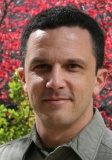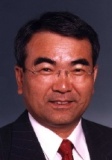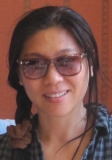Speakers
|
Dr. Serge BelongieProfessor, Computer Science and Engineering University of California, San Diego |
Topic: Visual Recognition With Humans in the Loop
Serge Belongie was born in Sacramento, California. He received the B.S. degree (with honor) in Electrical Engineering from the California Institute of Technology in 1995 and the M.S. and Ph.D. degrees in Electrical Engineering and Computer Sciences (EECS) at U.C. Berkeley in 1997 and 2000, respectively. While at Berkeley, his research was supported by a National Science Foundation Graduate Research Fellowship. He is also a co-founder of Digital Persona, Inc., and the principal architect of the Digital Persona fingerprint recognition algorithm. He is currently a Professor in the Computer Science and Engineering Department at U.C. San Diego. His research interests include computer vision and pattern recognition. He is a recipient of the NSF CAREER Award and the Alfred P. Sloan Research Fellowship. In 2004 MIT Technology Review named him to the list of the 100 top young technology innovators in the world (TR100).
|
Dr. Margrit BetkeProfessor and Associate Chair, Department of Computer Science Boston University |
Topic: Seeing in the Dark - Unveiling the Flight Behavior of Gregarious Bats Using Thermal Imaging
Margrit Betke is a Professor of Computer Science at Boston University, where she co-leads the Image and Video Computing Research Group. She conducts research in computer vision, in particular, the development of methods for detection, segmentation, registration, and tracking of objects in visible-light, infrared, and x-ray image data. She has worked on gesture, vehicle, and animal tracking, video-based human-computer interfaces, statistical object recognition, and medical imaging analysis. She has published over 80 original research papers. She earned her Ph.D. degree in Computer Science and Electrical Engineering at the Massachusetts Institute of Technology in 1995. Prof. Betke has received the National Science Foundation Faculty Early Career Development Award in 2001 for developing "Video-based Interfaces for People with Severe Disabilities." She co-invented the "Camera Mouse," an assistive technology used worldwide by children and adults with severe motion impairments. While she was a Research Scientist at the Massachusetts General Hospital and Harvard Medical School, she co-developed the first patented algorithms for detecting and measuring pulmonary nodule growth in computed tomography. She was one of two academic honorees of the "Top 10 Women to Watch in New England Award" by Mass High Tech in 2005. She currently leads a 5-year research program to develop intelligent tracking systems that reason about group behavior of people, bats, birds, and cells.
|
Prof. Yan Qiu ChenProfessor, Computer Science and Technology Fudan University |
Topic: Multi-view 3D Tracking of Particle System and Deforming Surface and Its Application to Biomedical Research.
Yan Qiu Chen received his Ph.D. from Southampton University, United Kingdom in 1995; and his M.Eng. and B.Eng. from Tongji University, Shanghai, China in 1988 and 1985 respectively. Dr. Chen is currently a full professor with School of Computer Science at Fudan University, Shanghai, China, and is a member of Fudan University Academic Committee, and chairman of Computer Science School Academic Committee. He had been Chairman of Department of Communication Science and Engineering from 2004 through 2007, and Associate Chairman of Department of Computer Science and Engineering from 2002 through 2004. Dr. Chen was an assistant professor with School of Electrical and Electronic Engineering of Nanyang Technological University, Singapore from 1996 through 2001; and was a postdoctoral research fellow with Glamorgan University, UK in 1995.
|
Dr. Robert CollinsAssociate Professor Co-Director: Laboratory for Perception, Action, and Cognition (LPAC) The Pennsylvania State University |
Topic: Video Tracking and Crowd Scene Analysis
Dr. Collins joined the faculty of CSE as an associate professor in spring 2005. Prior to joining CSE, he was an associate research professor at the Robotics Institute of Carnegie Mellon University. He received his Ph.D. in computer science in 1993 from the University of Massachusetts in Amherst, MA, for work on scene reconstruction using stochastic projective geometry.
Dr. Collins is co-director of the Laboratory for Perception, Action, and Cognition (LPAC) in the CSE department. His research area is computer vision, with an emphasis on video scene understanding, automated surveillance, human activity modeling, and real-time tracking. From 1992 to 1996, he was technical director of the DARPA RADIUS project at UMass, which developed vision algorithms for recovering 3D site models from multiple, oblique aerial views. From 1996 to 1999, Dr. Collins was technical director of the DARPA Video Surveillance and Monitoring (VSAM) project at CMU, which demonstrated a real-time, automated multi-camera video surveillance system for monitoring the activities of people and vehicles in a complex scene. Dr. Collins developed video visualization tools and rapid camera calibration routines for the 30-camera EyeVision system, demonstrated during the live broadcast of Superbowl XXXV in January 2001. From 2002 to 2004, he was co-PI of the DARPA HumanID project, which explored new algorithms for biometric identification based on gait, non-frontal facial views, and facial expression. His current research is on real-time, appearance-based object tracking, with a special emphasis on tracking moving objects from moving camera platforms. This work has been used to perform surveillance from unmanned air vehicles (DARPA VIVID program, Co-PI) and to navigate an unmanned water vehicle in river and harbor environments (DARPA Mars2020 program, PI). Dr. Collins is PI of a current NSF grant on persistent tracking of objects in video and a Co-PI of a multi-disciplinary NSF grant for applying computer vision technology to analyze the social behavior of individuals and groups in crowds. He is an associate editor for the International Journal of Computer Vision.
|
Dr. Charless C. FowlkesAssistant Professor, Dept. of Computer Science Computational Vision Group University of California, Irvine |
Topic: Automating Biological Image and Shape Analysis
Charless Fowlkes received a BS with honors from Caltech in 2000 and a PhD in Computer Science from the University of California, Berkeley in 2005, where his research was supported by a US National Science Foundation Graduate Research Fellowship. He is currently an Assistant Professor in the Department of Computer Science at the University of California, Irvine. His research interests are in computer and human vision, in particular how to combine bottom-up processing, such as image segmentation with top-down information, such as recognition of familiar shapes. He also works on developing tools for biological image analysis in order to measure and model morphology and spatial patterns of gene expression in animal development.
|
Dr. Takeo KanadeU.A. and Helen Whitaker University Professor, RI/CS The Robotics Institute Carnegie Mellon University |
Topic: TBD
Takeo Kanade is the U. A. and Helen Whitaker University Professor of Computer Science and Robotics and the director of Quality of Life Technology Engineering Research Center at Carnegie Mellon University. He received his Doctoral degree in Electrical Engineering from Kyoto University, Japan, in 1974. After holding a faculty position in the Department of Information Science, Kyoto University, he joined Carnegie Mellon University in 1980. He was the Director of the Robotics Institute from 1992 to 2001. He also founded the Digital Human Research Center in Tokyo and served as the founding director from 2001 to 2010.
Dr. Kanade works in multiple areas of robotics: computer vision, multi-media, manipulators, autonomous mobile robots, medical robotics and sensors. He has written more than 400 technical papers and reports in these areas, and holds more than 20 patents. He has been the principal investigator of more than a dozen major vision and robotics projects at Carnegie Mellon.
Dr. Kanade has been elected to the National Academy of Engineering and the American Academy of Arts and Sciences. He is a Fellow of the IEEE, a Fellow of the ACM, a Founding Fellow of American Association of Artificial Intelligence (AAAI), and the former and founding editor of International Journal of Computer Vision. Awards he received includes the Franklin Institute Bower Prize, ACM/AAAI Newell Award, Okawa Award, C&C Award, Tateishi Grand Prize, Joseph Engelberger Award, IEEE Robotics and Automation Society Pioneer Award, FIT Accomplishment Award, and IEEE PAMI-TC Azriel Rosenfeld Lifetime Accomplishment Award.
|
Dr. Erik G. Learned-MillerAssociate Professor, Computer Science University of Massachusetts Amherst |
Topic: Image Alignment, Image Comparison, and Digital Atlases
Erik G. Learned-Miller (previously Erik G. Miller) is an Associate Professor of Computer Science at the University of Massachusetts, Amherst, where he joined the faculty in 2004. He spent two years as a post-doctoral researcher at the University of California, Berkeley, in the Computer Science Division. Learned-Miller received a B.A. in Psychology from Yale University in 1988. In 1989, he co-founded CORITechs, Inc., where he and co-founder Rob Riker developed the second FDA cleared system for image-guided neurosurgery. He worked for Nomos Corporation, Pittsburgh, PA, for two years as the manager of neurosurgical product engineering. He obtained Master of Science (1997) and Ph. D. (2002) degrees from the Massachusetts Institute of Technology, both in Electrical Engineering and Computer Science. In 2006, he received an NSF CAREER award for his work in computer vision and machine learning.
|
Dr. Yanxi LiuAssociate Professor Co-Director: Laboratory for Perception, Action, and Cognition (LPAC) The Pennsylvania State University |
Topic: Capturing Near-regular Patterns in Digitized Life Sciences
Topic: Discriminative Subspace Learning in Large, Multi-media Biomedical Image Databases - a blessing of dimensionality
Yanxi Liu received her B.S. degree in physics/electrical engineering in Beijing, China, and her Ph.D. degree in computer science for group theory applications in robotics from the University of Massachusetts. Her postdoctoral training was performed in LIFIA/IMAG, Grenoble, France. She has also spent one year at DIMACS (NSF center for Discrete Mathematics and Theoretical Computer Science) with an NSF research-education fellowship award.
Before joining the Departments of Computer Science and Engineering and Electrical Engineering at Penn State in Fall 2006 as a tenured faculty member, Dr. Liu had been with the faculty of the Robotics Institute of Carnegie Mellon University, and affiliated with the Machine Learning Department of CMU. She is also an adjunct associate professor in the Radiology Department of University of Pittsburgh and a guest professor of Huazhong University of Science and Technology in China.
Dr. Liu is the co-director (with Dr. Collins) of the Laboratory for Perception, Action, and Cognition (LPAC) at Penn State. Dr. Liu's research interests span a wide range of applications in computer vision and pattern recognition, computer graphics, medical image analysis and robotics, with two main themes: computational (a)symmetry and discriminative subspace learning. Computational symmetry addresses issues of robust representation, detection, analysis and synthesis of real world (a)symmetries and near-regularities. Discriminative subspace learning focuses on discovering low-dimensional discriminative subspaces from very large (multi-million), multi-modality feature spaces for biomedical image database and computer aided diagnosis applications in particular. With her colleagues, Dr. Liu won first place in the clinical science category and the best paper overall at the Annual Conference of Plastic and Reconstructive Surgeons for the paper "Measurement of Asymmetry in Persons with Facial Paralysis."
Dr. Liu chaired the First International Workshop on Computer Vision for Biomedical Image Applications (CVBIA) in conjunction with ICCV 2005 in Beijing, and co-edited the book: "CVBIA: Current Techniques and Future Trends," Springer-Verlag LNCS 3765. Dr. Liu serves as a reviewer/committee member/panelist for all major journals, conferences, and NIH/NSF panels of computer vision, pattern recognition, biomedical image analysis, and machine learning. She served as a chartered study section member (3-year term) for Biomedical Computing and Health Informatics at NIH. She is a senior member of IEEE and the IEEE Computer Society.
|
Prof. Hong MaProfessor and Dean School of Life Sciences, Fudan University |
Topic: Chromosome behaviors during Arabidopsis meiosis reveal meiotic recombination mechanisms
Education:
Ph.D., Massachusetts Institute of Technology, 1988
B.A., Temple University, 1983
Postdoc Training:
California Institute of Technology, 1988-1990
Honors and Awards:
Faculty Scholars Medal in Life and Health Sciences, 2005
Guggenheim Fellowship 2004-2005
American Cancer Society Junior Faculty Research Award 1994-1997
|
Dr. Anant MadabhushiAssociate Professor, Department of Biomedical Engineering Director, Laboratory for Computational Imaging and Bioinformatics (LCIB) Rutgers The State University of New Jersey |
Topic: Histologic image analysis - unique challenges in digital pathology
Dr. Anant Madabhushi is the Director of the Laboratory for Computational Imaging and Bioinformatics (LCIB) and an Associate Professor in the Department of Biomedical Engineering, Rutgers University. Dr. Madabhushi received his Bachelors Degree in Biomedical Engineering from Mumbai University, India in 1998 and his Masters in Biomedical Engineering from the University of Texas, Austin in 2000. In 2004 he obtained his PhD in Bioengineering from the University of Pennsylvania. He joined the Department of Biomedical Engineering, Rutgers University as an Assistant Professor in 2005. He was promoted to Associate Professor with Tenure in 2010. He is also a member of the Cancer Institute of New Jersey, an Adjunct Associate Professor of Radiology at the Robert Wood Johnson Medical Center, an Adjunct Associate Professor of Radiology at Boston Medical Center, and an Adjunct Associate Professor of Pathology at the University of Pennsylvania. Dr. Madabhushi has authored over 150 peer-reviewed publications in leading international journals and conferences. He has one patent, 15 pending, and 1 provisional patents in the areas of medical image analysis, computer-aided diagnosis, and computer vision. He is an Associate Editor for IEEE Transactions on Biomedical Engineering, IEEE Transactions on Biomedical Engineering Letters, BMC Cancer and Medical Physics. He is also on the Editorial Board of the Journal Analytical and Cellular Pathology. He has been the recipient of a number of awards for both research as well as teaching, including the Busch Biomedical Award (2006), the Technology Commercialization Award (2006), the Coulter Phase 1 and Phase 2 Early Career award (2006, 2008), the Excellence in Teaching Award (2007-2009), the Cancer Institute of New Jersey New Investigator Award (2007, 2009), the Society for Imaging Informatics in Medicine (SIIM) New Investigator award (2008), and the Life Sciences Commercialization Award (2008, 2011). He is also a Wallace H. Coulter Fellow and a Senior IEEE member. His research work has received grant funding from the National Cancer Institute (NIH), New Jersey Commission on Cancer Research, the Society for Imaging Informatics, the Department of Defense, and from Industry. He is also a co-founder of Ibris Inc, a start-up company focused on developing computerized image analysis based technology for breast cancer prognosis.
|
Dr. B. S. ManjunathDirector, Center for Bio-image Informatics Vice Chair and Undergraduate Program Director, Dept. of Electrical and Computer Engineering University of California, Santa Barbra |
Topic: Bioimage Informatics, Part 1: Image analysis challenges
Topic: Bioimage Informatics, Part 2: Bisque platform for high-throughput, web-based, bioimage analysis
Research Interests: Image/video analysis (including texture and shape analysis, segmentation, registration), multimedia databases and data mining (feature extraction, content based access, high dimensional indexing and similarity search), steganography (data hiding in images and video, and their detection), and signal/image processing for bio-informatics.
Manjunath directs the NSF/ITR funded Bio-Image Informatics Center and was the Principal Investigator for the NSF/IGERT program on Interactive Digital Multimedia. He has published about 250 articles in various journals and peer reviewed conferences and his publications have been cited extensively.
|
Dr. Hanchuan PengSenior Computer Scientist, Janelie Farm Research Campus Howard Hughes Medical Institute (HHMI) |
Topic: Vaa3D: high-performance visualization & analysis for 3D images
Topic: High-throughput analysis of microscopic images using 3D digital atlases of model animals
is currently a senior computer scientist and the head of a computational bioimage analysis lab at Janelia Farm Research Campus, Howard Hughes Medical Institute. He was previously with Lawrence Berkeley National Laboratory, UC Berkeley, on computational biology, bioinformatics, and high-performance data mining, and Johns Hopkins University Medical School on human brain imaging and analysis. Dr. Peng is interested in bioimage analysis and large-scale informatics, as well as computational biology. His recent work has been focusing on developing novel algorithms for 3D+ image analysis and data mining, building single-neuron whole-brain level 3D digital atlases for animals including fruit fly and C. elegans, and V3D, which is a high-performance visualization-assisted analysis system for large 3D+ biological and biomedical- image data sets. He is also the inventor of the minimum-redundant maximum-relevance (mRMR) feature selection algorithm. Dr. Peng is an organizer of some recent international meetings on microscopic image analysis and informatics, e.g. 2005 (Stanford), 2006 (Santa Barbara) and 2009 and 2011 (Janelia Farm) Bioimage Informatics Conferences, 2010 Turning-Images-to-Knowledge Conference (Janelia Farm), 2008 and 2010 Computer Vision for Neurosciences meetings, 2010 Hackathon on 3D Image Visualization and Analysis, etc.
|
Dr. Zhuowen TuAssistant Professor Depts. of Neurology and Computer Science University of California, Los Angeles |
Topic: Discriminative Models for Medical Imaging
Zhuowen Tu's current research is on exploring structural information within/between data population for computer vision, machine learning, and medical imaging. He is also deveoping theoratical and practical methods along supervised, weakly-supervised, and unsupervised learning.
Zhuowen Tu is currently taking a leave of absence to work at Microsoft Research Asia; he is an assistant professor in the lab of neuro imaging (LONI), and the Department of Computer Science, University of California, Los Angeles. He is also affiliated with the Bioengineering IDP program and Bioinformatics IDP program at UCLA. He received his PhD from the Ohio State University.
|
Xiaohui Wu, Ph.D.Professor Institute of Developmental Biology and Molecular Medicine Fudan University |
Topic: Phenotypic Analysis of Developmental and Metabolic Defects in Mice
Professor Wu, Xiaohui obtained his B.S. and Ph.D. degrees at Fudan University (FDU) in 1995 and 2001, respectively. He joined Institute of Developmental Biology and Molecular Medicine (IDM), FDU in 2001, where he was promoted to an Associate Professor, Professor, and Distinguished Professor in 2002, 2005, and 2008, respectively. He also serves as a member of the Developmental Genetics Committee of the Genetics Society of China, and the Council of Shanghai Genetics Society.
|
Prof. Hongbo YuFudan University |
Topic: Multiple scale functional and structural imaging in vivo
B. A. degree in Biology in 1995 from University of Science and Technology of China (USTC); Ph. D. in Biophysics from USTC in 2000, in a joint program of USTC and Fudan University from 1997 to 2000. Post-doctoral fellow at Picower Institute of Learning and Memory and Department of Brain and Cognitive Sciences in MIT from 2000 to 2009; Professor in the School of Life Sciences, Fudan University, since 2009.
|
Tao P. Zhong, Ph.D.Professor of Developmental Genetics School of Life Sciences Fudan University |
Topic: Part I: Heart Patterning and Morphogenesis
Topic: Part II: Vascular Patterning and Morphogenesis
Dr. Tao Zhong is Full Professor in School of Life Sciences in Fudan University. His research interests focus on signaling and molecular mechanisms regulating embryo development as well as cardiovascular patterning and morphogenesis. Dr. Zhong graduated from Fudan University Shanghai Medical School in Medicinal Chemistry in 1987. He obtained his Ph.D. in Genetics from Cold Spring Harbor Laboratory and State University of New York at Stony Brook in 1995, where he studied yeast cell cycle and protein translation regulation. He then moved to MIT and Harvard Medical School as a postdoctor fellow to study heart and blood vessel development in zebrafish, an ideal vertebrate model that affords a powerful combination of genetic analyses with molecular, chemical and computation approaches. Dr. Zhong obtained his first faculty position in Vanderbilt University School of Medicine in 2002, where he was appointed as Assistant Professor (tenure-track) in Medicine, Pharmacology and Cell & Developmental Biology. He also served as Invited Lecture Professor in Fudan University (2002-2010). Dr. Zhong's group currently investigates development and regeneration of heart and blood vessel using a combination of approaches in genetics, development, chemistry and computation.















